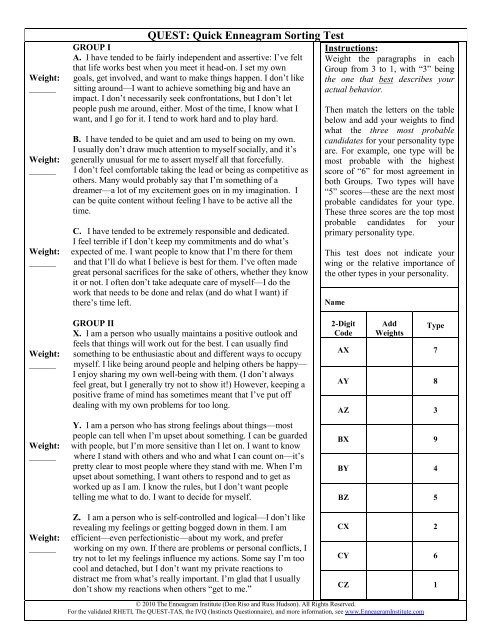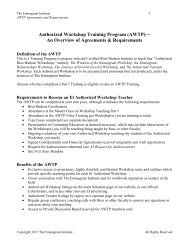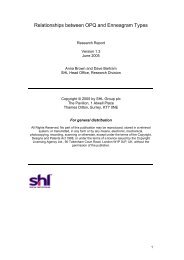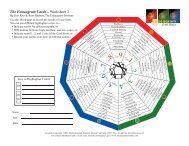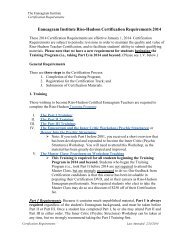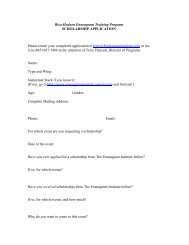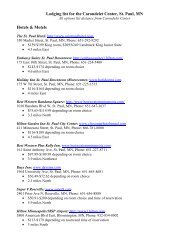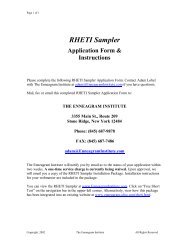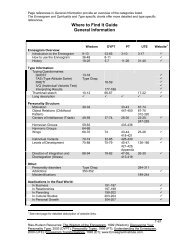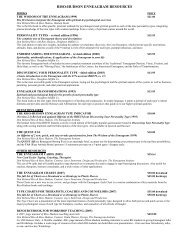QUEST: Quick Enneagram Sorting Test - Enneagram Institute
QUEST: Quick Enneagram Sorting Test - Enneagram Institute
QUEST: Quick Enneagram Sorting Test - Enneagram Institute
Create successful ePaper yourself
Turn your PDF publications into a flip-book with our unique Google optimized e-Paper software.
<strong>QUEST</strong>: <strong>Quick</strong> <strong>Enneagram</strong> <strong>Sorting</strong> <strong>Test</strong><br />
GROUP I<br />
A. I have tended to be fairly independent and assertive: I’ve felt<br />
that life works best when you meet it head-on. I set my own<br />
Weight: goals, get involved, and want to make things happen. I don’t like<br />
______ sitting around—I want to achieve something big and have an<br />
impact. I don’t necessarily seek confrontations, but I don’t let<br />
people push me around, either. Most of the time, I know what I<br />
want, and I go for it. I tend to work hard and to play hard.<br />
B. I have tended to be quiet and am used to being on my own.<br />
I usually don’t draw much attention to myself socially, and it’s<br />
Weight: generally unusual for me to assert myself all that forcefully.<br />
______ I don’t feel comfortable taking the lead or being as competitive as<br />
others. Many would probably say that I’m something of a<br />
dreamer—a lot of my excitement goes on in my imagination. I<br />
can be quite content without feeling I have to be active all the<br />
time.<br />
C. I have tended to be extremely responsible and dedicated.<br />
I feel terrible if I don’t keep my commitments and do what’s<br />
Weight: expected of me. I want people to know that I’m there for them<br />
______ and that I’ll do what I believe is best for them. I’ve often made<br />
great personal sacrifices for the sake of others, whether they know<br />
it or not. I often don’t take adequate care of myself—I do the<br />
work that needs to be done and relax (and do what I want) if<br />
there’s time left.<br />
GROUP II<br />
X. I am a person who usually maintains a positive outlook and<br />
feels that things will work out for the best. I can usually find<br />
Weight: something to be enthusiastic about and different ways to occupy<br />
______ myself. I like being around people and helping others be happy—<br />
I enjoy sharing my own well-being with them. (I don’t always<br />
feel great, but I generally try not to show it!) However, keeping a<br />
positive frame of mind has sometimes meant that I’ve put off<br />
dealing with my own problems for too long.<br />
Y. I am a person who has strong feelings about things—most<br />
people can tell when I’m upset about something. I can be guarded<br />
Weight: with people, but I’m more sensitive than I let on. I want to know<br />
______ where I stand with others and who and what I can count on—it’s<br />
pretty clear to most people where they stand with me. When I’m<br />
upset about something, I want others to respond and to get as<br />
worked up as I am. I know the rules, but I don’t want people<br />
telling me what to do. I want to decide for myself.<br />
Z. I am a person who is self-controlled and logical—I don’t like<br />
revealing my feelings or getting bogged down in them. I am<br />
Weight: efficient—even perfectionistic—about my work, and prefer<br />
______ working on my own. If there are problems or personal conflicts, I<br />
try not to let my feelings influence my actions. Some say I’m too<br />
cool and detached, but I don’t want my private reactions to<br />
distract me from what’s really important. I’m glad that I usually<br />
don’t show my reactions when others “get to me.”<br />
Instructions:<br />
Weight the paragraphs in each<br />
Group from 3 to 1, with “3” being<br />
the one that best describes your<br />
actual behavior.<br />
Then match the letters on the table<br />
below and add your weights to find<br />
what the three most probable<br />
candidates for your personality type<br />
are. For example, one type will be<br />
most probable with the highest<br />
score of “6” for most agreement in<br />
both Groups. Two types will have<br />
“5” scores—these are the next most<br />
probable candidates for your type.<br />
These three scores are the top most<br />
probable candidates for your<br />
primary personality type.<br />
This test does not indicate your<br />
wing or the relative importance of<br />
the other types in your personality.<br />
Name<br />
2-Digit<br />
Code<br />
Add<br />
Weights<br />
© 2010 The <strong>Enneagram</strong> <strong>Institute</strong> (Don Riso and Russ Hudson). All Rights Reserved.<br />
For the validated RHETI, The <strong>QUEST</strong>-TAS, the IVQ (Instincts Questionnaire), and more information, see www.<strong>Enneagram</strong><strong>Institute</strong>.com<br />
AX<br />
AY<br />
AZ<br />
BX<br />
BY<br />
BZ<br />
CX<br />
CY<br />
CZ<br />
Type<br />
7<br />
8<br />
3<br />
9<br />
4<br />
5<br />
2<br />
6<br />
1
The Nine Personality Types of the <strong>Enneagram</strong><br />
1. The Reformer. The principled, idealistic type. Ones<br />
are conscientious and ethical, with a strong sense of right<br />
and wrong. They are teachers, crusaders, and advocates<br />
for change: always striving to improve things, but afraid<br />
of making a mistake. Well-organized, orderly, and<br />
fastidious, they try to maintain high standards, but can<br />
slip into being critical and perfectionistic. They typically<br />
have problems with resentment and impatience. At their<br />
Best: wise, discerning, realistic, and noble. Can be<br />
morally heroic.<br />
2. The Helper. The caring, interpersonal type. Twos are<br />
empathetic, sincere, and warm-hearted. They are friendly,<br />
generous, and self-sacrificing, but can also be sentimental,<br />
flattering, and people-pleasing. They are well-meaning<br />
and driven to be close to others, but can slip into doing<br />
things for others in order to be needed. They typically<br />
have problems with possessiveness and with<br />
acknowledging their own needs. At their Best: unselfish<br />
and altruistic, they have unconditional love for others.<br />
3. The Achiever. The adaptable, success-oriented type.<br />
Threes are self-assured, attractive, and charming.<br />
Ambitious, competent, and energetic, they can also be<br />
status-conscious and highly driven for advancement. They<br />
are diplomatic and poised, but can also be overly<br />
concerned with their image and what others think of them.<br />
They typically have problems with workaholism and<br />
competitiveness. At their Best: self-accepting, authentic,<br />
everything they seem to be—role models who inspire<br />
others.<br />
4. The Individualist. The introspective, romantic type.<br />
Fours are self-aware, sensitive, and reserved. They are<br />
emotionally honest, creative, and personal, but can also be<br />
moody and self-conscious. Withholding themselves from<br />
others due to feeling vulnerable and defective, they can<br />
also feel disdainful and exempt from ordinary ways of<br />
living. They typically have problems with melancholy,<br />
self-indulgence, and self-pity. At their Best: inspired and<br />
highly creative, they are able to renew themselves and<br />
transform their experiences.<br />
5. The Investigator. The perceptive, cerebral type. Fives<br />
are alert, insightful, and curious. They are able to<br />
concentrate and focus on developing complex ideas and<br />
skills. Independent, innovative, and inventive, they can<br />
also become preoccupied with their thoughts and<br />
imaginary constructs. They become detached, yet highstrung<br />
and intense. They typically have problems with<br />
eccentricity, nihilism, and isolation. At their Best:<br />
visionary pioneers, often ahead of their time, and able to<br />
see the world in an entirely new way.<br />
6. The Loyalist. The committed, security-oriented type.<br />
Sixes are reliable, hard-working, responsible, and<br />
trustworthy. Excellent “troubleshooters,” they foresee<br />
problems and foster cooperation, but can also become<br />
defensive, evasive, and anxious—running on stress while<br />
complaining about it. They can be cautious and<br />
indecisive, but also reactive, defiant and rebellious. They<br />
typically have problems with self-doubt and suspicion. At<br />
their Best: internally stable and self-reliant, courageously<br />
championing themselves and others.<br />
7. The Enthusiast. The busy, productive type. Sevens are<br />
extroverted, optimistic, versatile, and spontaneous.<br />
Playful, high-spirited, and practical, they can also<br />
misapply their many talents, becoming over-extended,<br />
scattered, and undisciplined. They constantly seek new<br />
and exciting experiences, but can become distracted and<br />
exhausted by staying on the go. They typically have<br />
problems with impatience and impulsiveness.<br />
At their Best: they focus their talents on worthwhile goals,<br />
becoming appreciative, joyous, and satisfied.<br />
8. The Challenger. The powerful, aggressive type. Eights<br />
are self-confident, strong, and assertive. Protective,<br />
resourceful, straight-talking, and decisive, but can also be<br />
ego-centric and domineering. Eights feel they must<br />
control their environment, especially people, sometimes<br />
becoming confrontational and intimidating. Eights<br />
typically have problems with their tempers and with<br />
allowing themselves to be vulnerable. At their Best: selfmastering,<br />
they use their strength to improve others' lives,<br />
becoming heroic, magnanimous, and inspiring.<br />
9. The Peacemaker. The easy-going, self-effacing type.<br />
Nines are accepting, trusting, and stable. They are usually<br />
grounded, supportive, and often creative, but can also be<br />
too willing to go along with others to keep the peace.<br />
They want everything to go smoothly and be without<br />
conflict, but they can also tend to be complacent and<br />
emotionally distant, simplifying problems and ignoring<br />
anything upsetting. They typically have problems with<br />
inertia and stubbornness. At their Best: indomitable and<br />
all-embracing, they are able to bring people together and<br />
heal conflicts.<br />
Our special thanks and acknowledgment to our student and colleague,<br />
Carl Dyer, who inspired our development of the <strong>QUEST</strong>.<br />
Copyright 2010 The <strong>Enneagram</strong> <strong>Institute</strong> All Rights Reserved.<br />
The <strong>Enneagram</strong> <strong>Institute</strong><br />
3355 Main St., Route 209 Stone Ridge, NY 12484<br />
Tel: 845-687-9878 fax: 845-687-7486 askEI@<strong>Enneagram</strong><strong>Institute</strong>.com


